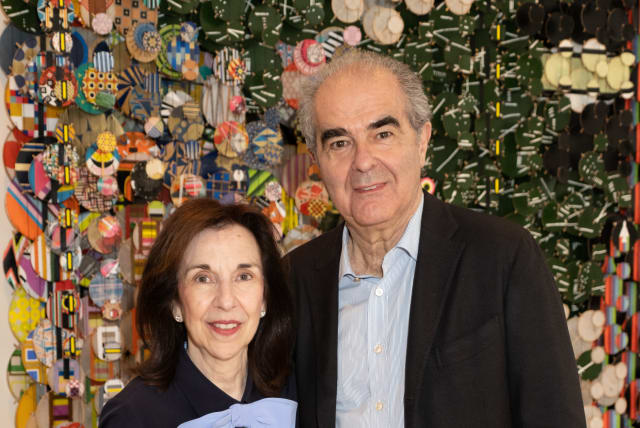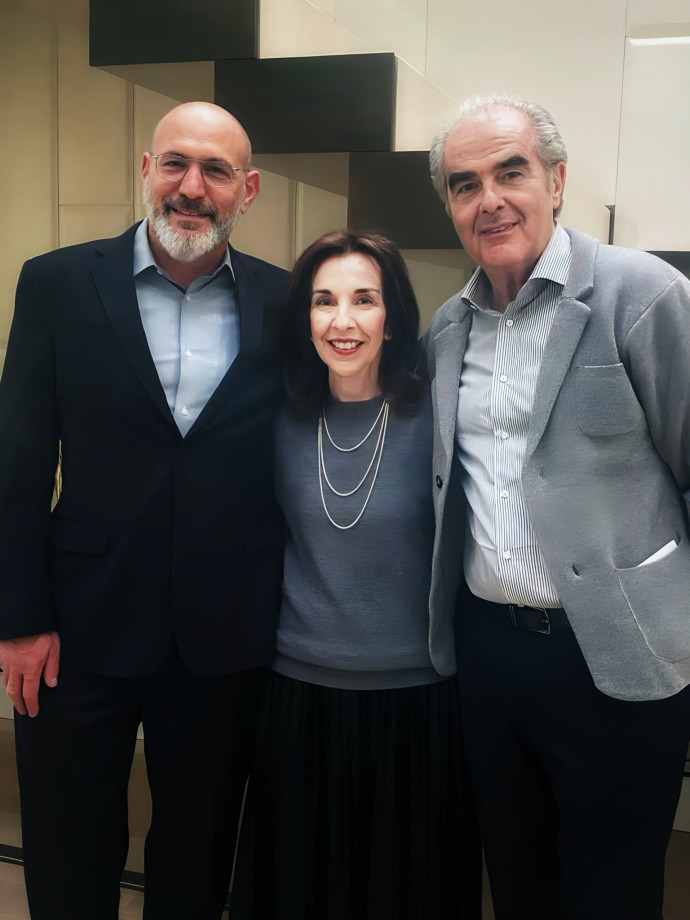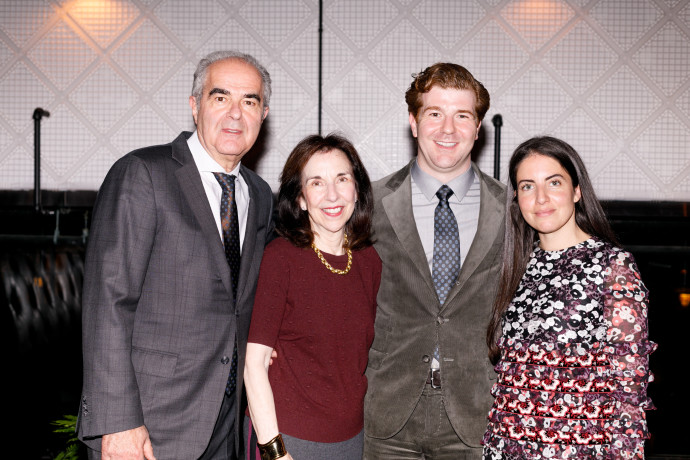Nathan and Glennie Lindenberg: 'Working as a team'

With 47 years of marriage, the couple shares their life story and discusses their work for the Hebrew University and other charities.
Speaking with Nathan and Glennie Lindenberg, the biblical verse “Two are better than one” immediately comes to mind. The couple, who have been married for 47 years, have easy camaraderie and comfort with each other.
As evidence, one need look no further than the fact that they established the joint law firm of Lindenberg and Lindenberg in 1976. They are true partners in their professional, family, and community activities, particularly in their support of the Hebrew University of Jerusalem.
Nathan and Glennie Lindenberg come from different backgrounds. Nathan was born in Tel Aviv to Holocaust survivor parents who had come to Israel after World War II during the British Mandate. Nathan’s father served as a soldier during the War of Independence. Nathan and his parents moved to Canada when he was three years old.
“I was quite connected to Israel, though my parents didn’t speak Hebrew in the home,” he recalls. “Israel was part of our lives. We connected with our family, and we wrote letters to family there. It was always part of our consciousness.” In 1964, Nathan and his parents traveled to Israel for his bar mitzvah.
Six years later, in 1970, Nathan went to Israel to study at Hebrew University’s one-year program for overseas students. “It was just three years after the Six Day War,” he says. “Israel was an incredible place in those heady times. The country was on a high, and our hopes and dreams seemed to be fully realized. It was an incredible time to be in Israel and a student at the Hebrew University.”
Glennie was born in Toronto, where she attended Hebrew day schools. Her mother, who was born in Poland, had gone to Toronto before WW II, and her father was a Holocaust survivor. “Jewish education was a priority in our house,” she says. Though she did not take her first trip to Israel until after she was married, Israel was always an integral part of her life and Jewish identity.
She and Nathan met while studying law in Toronto. Glennie says that her first trip to Israel was an overwhelming experience. “I was in my early 20s, and I went with Nathan. We met family there from my father’s side and from Nathan’s side, and we traveled around the country. We had finished law school, and we spent seven and a half weeks there. I felt an immediate connection with the people in the country. It’s a totally different lens when you see your Jewishness through Israel.”
Glennie says that walking through the Hebrew University campus is an invigorating and energizing experience. “You meet the brightest young people, and we have the opportunity to meet many of the professors and academicians who visit Canada. We have hosted some of them in our home, and they are making a difference. The university itself is a wonderful place in terms of its diversity and inclusivity, and the lengths they go to encourage diversity are wonderful. I wish it were more well known.”
Having studied at Hebrew University, Nathan has always felt a connection to the school and says it was a natural place to direct their philanthropic efforts. “When he became involved in Hebrew University,” says Glennie, “it was wonderful work for him because he was so connected, and it was meaningful for me as well.
“Over the years, with Nathan’s volunteer work there and the many trips we made for Hebrew University board meetings, it has been very emotional. It’s a very inspiring and wonderful way to connect with the country. I have been uniquely privileged to see and know the university in a more intimate way because of Nathan’s involvement.”
Nathan says he finds developments in Hebrew University’s Science Department fascinating. “I don’t come from a science background, but I always find the natural sciences the most interesting. When you see the research being done, particularly on the medical side, you see the exciting advances being made at the university and people who are so brilliant making a contribution and fulfilling the mission of a university, which is for the betterment of humanity.
“When you go to the university and see the work being done and its implications for society as a whole, you can’t help but be inspired,” he asserts.
A decade ago, Nathan and Glennie were instrumental in founding the Institute for Medical Research Israel Canada, an incentive begun by the Canadian Friends of Hebrew University for medical research at the school’s Ein Karem campus. “It was quite fulfilling to see the research from there. We dealt with the work of Prof. Haim Sedar, a well-known biochemist who was doing cutting-edge research. You can’t help but be inspired when you see what these people are doing at the university,” says Nathan.
He explains that Hebrew University has several advantages that make it attractive to potential supporters. “It is the oldest and most well-known university in Israel. It has incredible alumni – people who have been in government, prime ministers, cabinet members, and those who have made contributions to Israeli society – plus a plethora of Nobel Prize winners who have come from the university. It is well known, and people tend to enjoy being identified with the winning side or the successful side. The university, with its achievements, sells itself.”
Nathan notes that the world of fundraising is constantly changing and evolving, and these changes have affected Hebrew University as well. “When I started,” he recalls, “no other organization in Canada had the presence of the Hebrew University. The playing field has become more crowded in the last few years, and our fundraising has evolved. We are dealing with more foundations and larger gifts, which take more time and need more nurturing, but we still have to maintain a grassroots presence and involve people on different levels.”
He adds that it is challenging in Toronto to maintain the profile of an institution that is 6,000 miles away from the community. In recent years, Hebrew University has developed joint ventures with institutions around the world, among them the University of Toronto.
“They transcend all avenues of endeavor in the arts and sciences, medical fields, computer engineering, and the humanities. That is the new wave of how we maintain our relevance in communities outside of Israel. Hebrew University has relationships with a significant number of leading universities in Europe, the US, and Toronto.”
Glennie, who played a vital role in the development of the Toronto Holocaust Museum, which opened this past June, says that all charitable organizations must involve younger members of the community. The Lindenbergs’ son is president of the Toronto chapter of the Canadian Friends of Hebrew University, and their daughter and son are active in other Jewish organizations as well. “No matter what charitable organization you are working with, it is crucial to engage the younger generation. I wish there was an easy answer, but you constantly have to work at investing in engaging younger people,” she says. “It is an ongoing challenge, but it is at the core of what we have to do to be around.”
Recalling one of her fundraising successes, she tells of a couple whom she thought must be approached for a donation to the Holocaust Museum. Her husband contacted them, and they made a generous gift. After the fundraising event, Glennie recalls, “They wrote that they appreciated the opportunity to be able to give and participate in the museum. This speaks volumes about fundraising – to be able to make the connection for someone else by asking them to make a gift, and this person appreciated being approached for a gift. That was very gratifying.”
Nathan chuckles, noting that his wife is a far more effective fundraiser than he is. Drawing from his own experiences when donating, he says, “When we stretch and make a larger gift than we anticipated, we feel better about ourselves and about making the gift. We are not unique in that respect. People want to give to their community in whatever way appeals to them. Just give people the opportunity to make a contribution, and you will be surprised.”
Glennie adds that it is gratifying to see one’s own children involved in charitable activities. “We can encourage people to think about being an example for their own families. It is rewarding for us to see them becoming more active.”
The final question of the interview centers on how Nathan and Glennie, who have been married for almost five decades, have managed to do so much together and succeed as a team. “I’m an extremely easy person to get along with and very agreeable. That’s the special sauce,” quips Nathan, while Glennie explodes in a paroxysm of laughter.
Ultimately, they both agree that it is about respecting each other’s abilities and sharing responsibilities. And that is why two is better than one.
This interview was conducted prior to the Oct. 7 attacks.
This article was written in cooperation with Canadian Friends of Hebrew University.
Jerusalem Post Store
`; document.getElementById("linkPremium").innerHTML = cont; var divWithLink = document.getElementById("premium-link"); if (divWithLink !== null && divWithLink !== 'undefined') { divWithLink.style.border = "solid 1px #cb0f3e"; divWithLink.style.textAlign = "center"; divWithLink.style.marginBottom = "15px"; divWithLink.style.marginTop = "15px"; divWithLink.style.width = "100%"; divWithLink.style.backgroundColor = "#122952"; divWithLink.style.color = "#ffffff"; divWithLink.style.lineHeight = "1.5"; } } (function (v, i) { });


